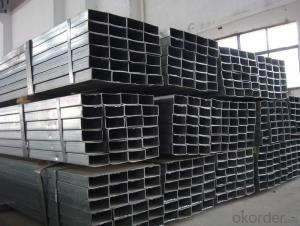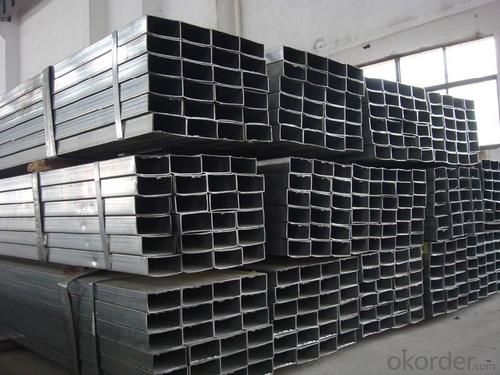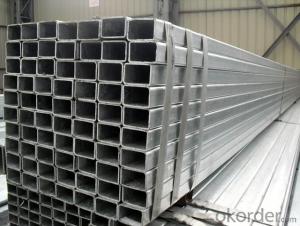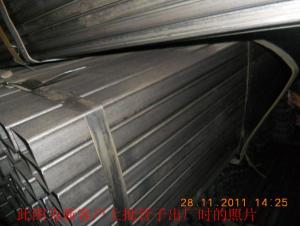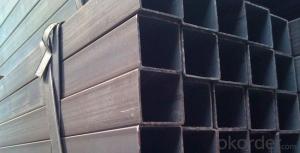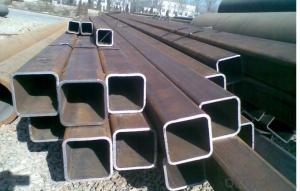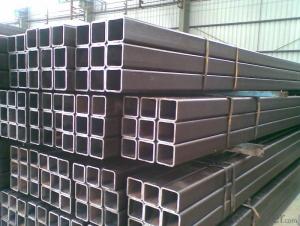Rectangular Hollow Section Pipe 5.8 meter
- Loading Port:
- China Main Port
- Payment Terms:
- TT OR LC
- Min Order Qty:
- -
- Supply Capability:
- -
OKorder Service Pledge
OKorder Financial Service
You Might Also Like
Product Name | ||
Size | Size: | 10*10--500*500mm |
Thickness: | 0.45--16mm | |
Length: | 3-12m | |
Steel Grade | Q195,Q215,Q235,Q345,16Mn, 20# | |
Standard | ASTM A500,EN10219,GB/T6728,GB/T6725,JIS G3466 | |
Usage | 1. For Structure, Airport, Railway 2. Construction and so on. | |
Ends | Plain end or By Your Choice | |
Surface | Bared Or With Oiled Or Galvanized | |
Technique | ERW ,Hot Rolled and Cold Rolled | |
Section Shape | ||
Inspection | With Hydraulic Testing, Eddy Current , Infrared Test | |
Package | Bags, Bundle, In Bulk, Containers | |
MOQ | 20 Metric Ton / Can Be Negotiated | |
Supply Ability | 15,000 Metric Ton/Month | |
Date of Delivery | 7 days(Qty within 1000 Metric Ton) or According To The Quantity | |
Port of Shipment | Tianjin, China | |
Payment | L/C T/T | |
- Q: What is the impact toughness of steel pipes?
- The impact toughness of steel pipes refers to the ability of the material to withstand sudden or high-velocity impacts without fracturing or breaking. It is a measure of the material's resistance to cracking under dynamic loading conditions. The impact toughness of steel pipes is an important property as it determines their ability to withstand accidental impacts or external forces during transportation, installation, and operation. The impact toughness of steel pipes is typically evaluated using standardized tests such as the Charpy V-notch test or the Izod test. These tests involve striking a notched sample of the steel pipe with a pendulum or a falling weight and measuring the energy absorbed by the material before it fractures. The impact toughness is then calculated based on this energy absorption. A high impact toughness is desirable in steel pipes as it indicates a greater ability to absorb energy and resist fracture, making them more resistant to sudden impacts or loading conditions. This is particularly important in applications where steel pipes are used in high-stress environments, such as in oil and gas pipelines, automotive components, or structural applications. Various factors can affect the impact toughness of steel pipes, including the chemical composition, heat treatment, and microstructure of the steel. For example, alloying elements like manganese, chromium, and nickel can enhance the impact toughness by promoting the formation of fine-grained microstructures and preventing the propagation of cracks. Similarly, proper heat treatment processes such as quenching and tempering can improve the impact toughness by optimizing the material's microstructure and mechanical properties. In summary, the impact toughness of steel pipes is a crucial property that determines their ability to withstand sudden or high-velocity impacts. It is evaluated through standardized tests and is influenced by factors like chemical composition, heat treatment, and microstructure. A high impact toughness is desirable in steel pipes to ensure their structural integrity and resistance to fracture under dynamic loading conditions.
- Q: What is the difference between carbon steel and stainless steel pipes?
- The main difference between carbon steel and stainless steel pipes lies in their composition and corrosion resistance. Carbon steel pipes are primarily made of iron and carbon, while stainless steel pipes contain iron, carbon, and a minimum of 10.5% chromium. This chromium content in stainless steel provides excellent corrosion resistance, making it more suitable for applications where pipes may come in contact with moisture or corrosive substances. Carbon steel pipes, on the other hand, are more cost-effective and commonly used in applications where corrosion resistance is not a primary requirement.
- Q: What is the role of steel pipes in the mining and extraction of minerals?
- The mining and extraction of minerals heavily rely on steel pipes, which have a vital role to play. These pipes are extensively utilized in diverse mining operations for the transportation of fluids like water and slurry. Moreover, they are employed to offer structural reinforcement and ventilation within underground mines. A fundamental application of steel pipes in mining is the transportation of water and slurry. Water is an essential component in the mining process, serving purposes such as dust suppression, ore processing, and site rehabilitation. The creation of a pipeline network using steel pipes enables the efficient transfer of water from its source, such as a reservoir or dam, to various areas within the mine. Similarly, slurry, a mixture of crushed minerals and water, is frequently conveyed through steel pipes to processing plants or tailings dams. Structural support is another critical function fulfilled by steel pipes in underground mines. The extraction of valuable mineral deposits necessitates the construction of tunnels and shafts. To endure the immense pressure exerted by the surrounding rock and prevent collapses, these underground excavations require reinforcement. Steel pipes, acting as support structures like roof bolts and rock bolts, strengthen the walls and roofs of these tunnels and shafts, thereby ensuring miner safety and maintaining the stability of the mine structure. Furthermore, steel pipes are employed in ventilation systems within underground mines. Proper ventilation is vital for mining operations, ensuring a continuous supply of fresh air, removal of harmful gases, and control of temperature and humidity levels. Steel pipes are utilized to create ventilation shafts and ducts, facilitating the smooth flow of air throughout the mine. This aids in preventing the accumulation of toxic gases, dust, and excessive heat, thereby maintaining a safe and healthy working environment for miners. To summarize, steel pipes are indispensable for the mining and extraction of minerals. They facilitate the transportation of fluids, offer structural reinforcement in underground mines, and contribute to efficient ventilation systems. The absence of steel pipes would significantly impede the efficient and safe extraction of minerals from mines.
- Q: What are the different methods of inspecting steel pipes for defects?
- There are several methods of inspecting steel pipes for defects, including visual inspection, magnetic particle inspection, ultrasonic testing, radiographic testing, and eddy current testing. Each method has its own advantages and limitations, and the choice of inspection method depends on factors such as the type of defect being searched for, the size and shape of the pipe, and the desired level of accuracy and sensitivity.
- Q: How are steel pipes used in the manufacturing of appliances?
- Steel pipes are commonly used in the manufacturing of appliances as they are strong, durable, and resistant to corrosion. These pipes are used for various purposes such as supply and distribution of water, gas, and other fluids, as well as for structural support and framework in appliances. They are often used for creating the internal plumbing systems, ventilation ducts, and electrical conduits in appliances, ensuring efficient functioning and reliability.
- Q: What are the different types of steel pipe flanges?
- There are several types of steel pipe flanges, including slip-on flanges, weld neck flanges, socket weld flanges, threaded flanges, blind flanges, and lap joint flanges. Each type has unique features and is used in specific applications based on factors such as pressure ratings, pipe size, and end connections.
- Q: Can steel pipes be used for chemical processing plants?
- Yes, steel pipes can be used for chemical processing plants. Steel pipes have excellent strength, durability, and resistance to corrosion, making them suitable for transporting various chemicals and fluids in a chemical processing plant. Additionally, steel pipes can withstand high temperatures and pressures, ensuring safe and efficient operations in such industrial settings.
- Q: Can steel pipes handle extreme weather conditions?
- Yes, steel pipes are known for their ability to handle extreme weather conditions. Steel is a durable and strong material that can withstand harsh environmental elements, including extreme temperatures, high winds, heavy rainfall, and even extreme weather events like hurricanes and tornadoes. Steel pipes are commonly used in various industries and applications, such as water and sewage systems, oil and gas pipelines, and construction projects, precisely because of their resilience and ability to withstand extreme weather conditions. Additionally, steel pipes can be coated or treated to enhance their resistance to corrosion, further increasing their ability to handle extreme weather conditions.
- Q: What are the different types of steel pipe elbows?
- There are several different types of steel pipe elbows that are commonly used in various industries and applications. These types include: 1. 90-degree elbows: These elbows have a sharp 90-degree bend and are commonly used when a change in direction is required to redirect the flow of fluid or gas. They are widely used in plumbing, construction, and industrial piping systems. 2. 45-degree elbows: Similar to 90-degree elbows, 45-degree elbows also provide a change in direction but with a smaller angle. They are often used in situations where a more gradual change in flow direction is required. 3. Long radius elbows: Long radius elbows have a larger radius of curvature compared to standard elbows. This design helps to reduce fluid friction and pressure drop, making them suitable for applications that require smoother flow, such as in high-flow systems or those involving viscous fluids. 4. Short radius elbows: In contrast to long radius elbows, short radius elbows have a smaller radius of curvature. They are generally used in tight spaces where a compact design is required, but they can cause higher pressure drops due to increased fluid friction. 5. Reducing elbows: These elbows are used when there is a need to connect pipes of different diameters. They have one end with a larger diameter and the other end with a smaller diameter, allowing for a smooth transition between two pipes of different sizes. 6. Mitered elbows: Mitered elbows are custom-made elbows that are fabricated by cutting and welding multiple sections of pipe at specific angles. They are often used in situations where standard elbows cannot accommodate the required angle or when a unique design is needed. Overall, the selection of the appropriate type of steel pipe elbow depends on factors such as the application, fluid flow requirements, space constraints, and compatibility with the piping system.
- Q: What is a tight steel tube?
- The tight steel tube is called "galvanized steel pipe with sleeve connection" or "flat pipe of steel metal for electrical installation". JDG. The utility model relates to a novel protective conduit for an electric circuit. The connecting sleeve and the metal accessory are provided with a wire pipeline composed of screw fastening connection technology, and the utility model does not need to do cross grounding, welding and covering, and the appearance is silvery white or yellow.
Send your message to us
Rectangular Hollow Section Pipe 5.8 meter
- Loading Port:
- China Main Port
- Payment Terms:
- TT OR LC
- Min Order Qty:
- -
- Supply Capability:
- -
OKorder Service Pledge
OKorder Financial Service
Similar products
Hot products
Hot Searches
Related keywords
